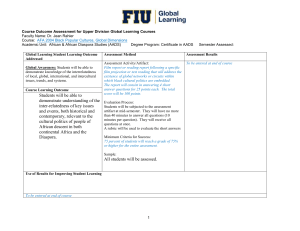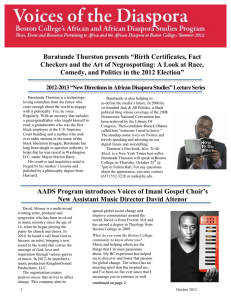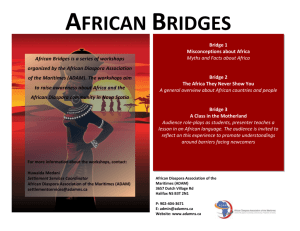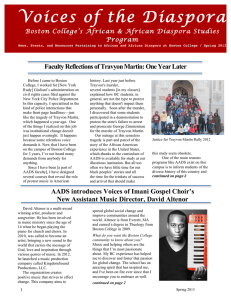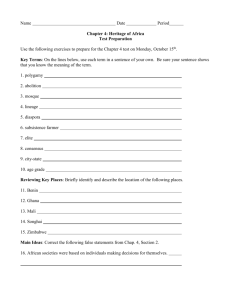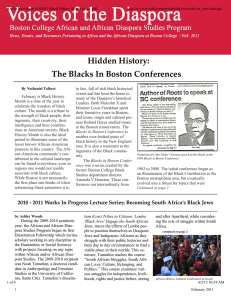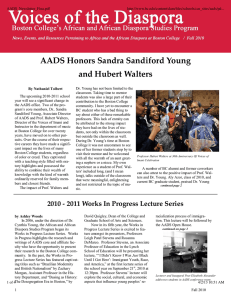AADS Introduces Voices of Imani Director Chauncey McGlathery
advertisement
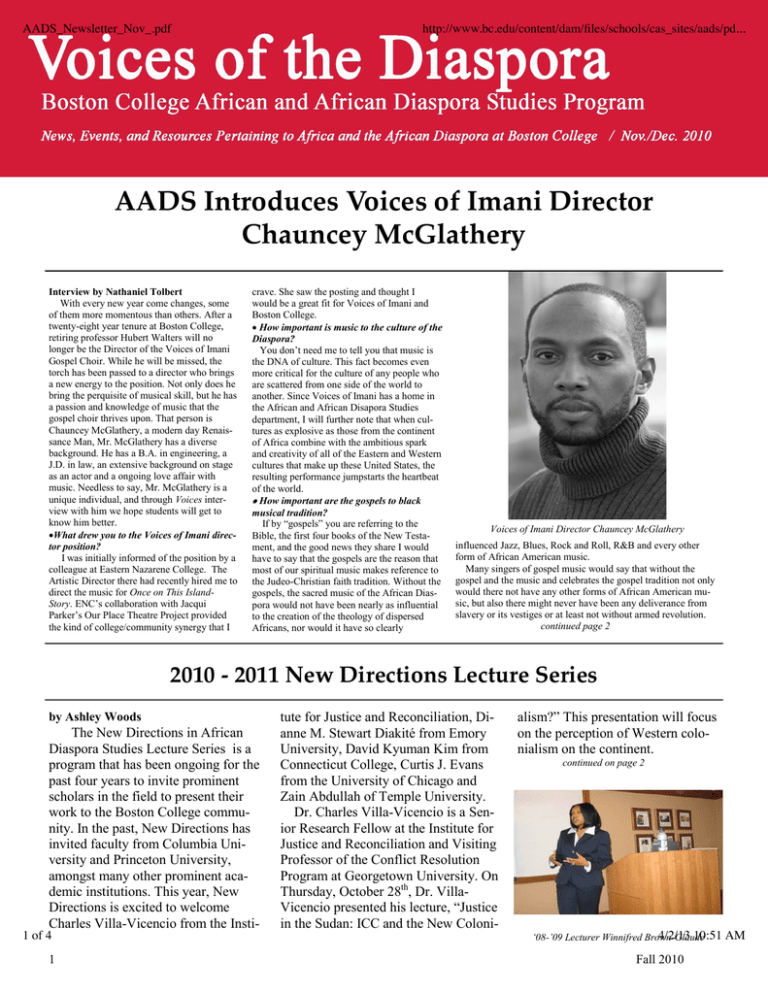
AADS_Newsletter_Nov_.pdf http://www.bc.edu/content/dam/files/schools/cas_sites/aads/pd... AADS Introduces Voices of Imani Director Chauncey McGlathery Interview by Nathaniel Tolbert With every new year come changes, some of them more momentous than others. After a twenty-eight year tenure at Boston College, retiring professor Hubert Walters will no longer be the Director of the Voices of Imani Gospel Choir. While he will be missed, the torch has been passed to a director who brings a new energy to the position. Not only does he bring the perquisite of musical skill, but he has a passion and knowledge of music that the gospel choir thrives upon. That person is Chauncey McGlathery, a modern day Renais- sance Man, Mr. McGlathery has a diverse background. He has a B.A. in engineering, a J.D. in law, an extensive background on stage as an actor and a ongoing love affair with music. Needless to say, Mr. McGlathery is a unique individual, and through Voices inter- view with him we hope students will get to know him better. What drew you to the Voices of Imani direc- tor position? I was initially informed of the position by a colleague at Eastern Nazarene College. The Artistic Director there had recently hired me to direct the music for Once on This Island- Story. ENC’s collaboration with Jacqui Parker’s Our Place Theatre Project provided the kind of college/community synergy that I crave. She saw the posting and thought I would be a great fit for Voices of Imani and Boston College. How important is music to the culture of the Diaspora? You don’t need me to tell you that music is the DNA of culture. This fact becomes even more critical for the culture of any people who are scattered from one side of the world to another. Since Voices of Imani has a home in the African and African Disapora Studies department, I will further note that when cul- tures as explosive as those from the continent of Africa combine with the ambitious spark and creativity of all of the Eastern and Western cultures that make up these United States, the resulting performance jumpstarts the heartbeat of the world. How important are the gospels to black musical tradition? If by “gospels” you are referring to the Bible, the first four books of the New Testa- ment, and the good news they share I would have to say that the gospels are the reason that most of our spiritual music makes reference to the Judeo-Christian faith tradition. Without the gospels, the sacred music of the African Dias- pora would not have been nearly as influential to the creation of the theology of dispersed Africans, nor would it have so clearly Voices of Imani Director Chauncey McGlathery influenced Jazz, Blues, Rock and Roll, R&B and every other form of African American music. Many singers of gospel music would say that without the gospel and the music and celebrates the gospel tradition not only would there not have any other forms of African American mu- sic, but also there might never have been any deliverance from slavery or its vestiges or at least not without armed revolution. continued page 2 2010 -‐‑ 2011 New Directions Lecture Series by Ashley Woods The New Directions in African Diaspora Studies Lecture Series is a program that has been ongoing for the past four years to invite prominent scholars in the field to present their work to the Boston College commu- nity. In the past, New Directions has invited faculty from Columbia Uni- versity and Princeton University, amongst many other prominent aca- demic institutions. This year, New Directions is excited to welcome Charles Villa-Vicencio from the Insti- 1 of 4 1 tute for Justice and Reconciliation, Di- anne M. Stewart Diakité from Emory University, David Kyuman Kim from Connecticut College, Curtis J. Evans from the University of Chicago and Zain Abdullah of Temple University. Dr. Charles Villa-Vicencio is a Sen- ior Research Fellow at the Institute for Justice and Reconciliation and Visiting Professor of the Conflict Resolution Program at Georgetown University. On Thursday, October 28th, Dr. Villa- Vicencio presented his lecture, “Justice in the Sudan: ICC and the New Coloni- alism?” This presentation will focus on the perception of Western colo- nialism on the continent. continued on page 2 4/2/13 10:51 „08-‟09 Lecturer Winnifred Brown-Glaude Fall 2010 AM AADS_Newsletter_Nov_.pdf http://www.bc.edu/content/dam/files/schools/cas_sites/aads/pd... Voices of the Diaspora New Directions 2010—2011 continued from page 1 Also this fall, New Directions will welcome Dr. Dianne M. Stewart Diakité in November 11th. Dr. Diakité will be lecturing on the legacy of Congolese Prophet, Kimpa Vita and her impact on Prophetic Christianity in Africa and the Diaspora. All New Directions events will take place at 4:30pm in Devlin 101. For more information on the New Direc- tion sin African Diaspora Studies, please visit our website at www.bc.edu/aads or email Cat McAteer at mcateerm@bc.edu AADS Staff Dr. Rhonda Frederick, Director (617) 552-3717 email: frederir@bc.edu „08-„09 Lecturer Rhonda Williams Dr. Sandra Sandiford Young,* Associate Director (617) 552-4938 email: sandra.sandiford.1@bc.edu Caitlin McAteer, Administrator (617) 552-3238 email: mcateerm@bc.edu *(on leave) „08-‟09 Lecturer Harvey Neptune AADS Introduces continued from page 1 2 of Of course, that is not the end of the story and nor was it the beginning. Originally, gospel music provided a space for the most ambitious and inti- mate of expressions between God and man ever heard. I hope to lead the Voices of Imani and the Boston College artistic community back into the time when gospel once again assumes it’s rightful position as the greatest social change agent the world has ever known. You have a unique and accomplished education background outside of the arts, what lead you into music? I was one of those unique kids that came into the world literally composed of music. Music was the first language that I spoke. It was the first sense I developed and it led me and still leads me into fully developing all my other senses. My father is an Aeronautics Engineer with NASA so he con- vinced me that engineering would make a much better trade, so I displaced music to the role of mistress while suffering in silence in Electrical Engineering classes like “Power and Thermodynamics.” The more I studied and lived the further I got away from a profession in music. I was prac- ticing law in New York City when the towers fell in 2001. It was then that I came to my senses and 4reunited with my first love. 2 What are your goals for the voices of Imani? Do you plan to expand the group or do anything new? One of the first things I did when I got to cam- pus was attend the Multicultural Christian Fellow- ship meeting. I was disappointed to hear from a former member of Voices that she did not feel that there was a place for the traditional African Ameri- can worship experience to be freely expressed. So, I have chosen this problem as my primary measure of success which I hope to solve by meeting two goals. The first goal for Voices is a return to the text. The first text we are returning to is the Bible, the blueprint of all true gospel music. The second text we are returning to is the lyric of the music that chronicles the journey of Africans and their progeny from the greatest continent in the world to the greatest country in the world. We are focused on “power” as the theme of the semester. I believe the students, the campus and this community has yet to truly taste and savor the good things brewing in Lyons Hall. But by this time next year, the word will be out. We are starting a “Jam” series this semester, which I hope will bring together the arts commu- nity as a whole around the ideas that inspire communi- ties to move in coordinated action. Hopefully, next se- mester we will combine all of the our talents campus- wide to write, record and produce another CD worthy of the tradition we bear as artists in the African Diaspora traditions. Director McGlathery 4/2/13 10:51 AM Fall 2010 AADS_Newsletter_Nov_.pdf http://www.bc.edu/content/dam/files/schools/cas_sites/aads/pd... Voices of the Diaspora Word Around the Community Each month Voices will include articles of note pertaining to the African and African Diaspora. Feel free to submit any articles that pique your interest to aads@bc.edu. Voters Are Much Less Optimistic About Black-White Relations Perceptions about the state of black-white relations in America have fallen dramatically since the summer of 2009. But voters are still more optimistic about that relationship than they are about relations between whites and Hispanics and between blacks and Hispanics. A new Rasmussen Reports national tele- phone survey finds that just 36% of voters now say relations between blacks and whites are getting better. That’s down from 62% in July of last year at the height of the controversy involv- ing a black Harvard professor and a white po- liceman. That number had fallen only slightly to 55% in April of this year. Twenty-seven percent (27%) now say black-white relations are getting worse, up 10 points from July 2009, while 33% think they’re staying about the same. African-Americans are much more pessi- mistic than whites. Thirty-nine percent (39%) of whites think black-white race relations are get- whites think black-white race relations are getting better, but just 13% of blacks agree. Confidence in the nation’s course among African-Americans soared after Barack Obama’s election. But then several prominent Democrats, perhaps most notably former President Jimmy Carter, suggested that oppo- sition to the president’s health care plan was motivated in part by racism. Read the rest of this article at rasmussenre- ports.com (10/6/2010) The Mean Girls of Morehouse Written By Alyia S. King Within the openly gay community at Alanta’s Morehouse College, there’s a subgroup: gender benders who rock makeup, Marc Jacobs’ tote bags, sky-high heels and Beyonce- style hair weaves. Can a man of Morehouse be gay? Absolutely. But can he be a woman? Meet the plastics. Diamond Martin Poulin, 20, teetering in strappy sandals with three-inch heels, steps Culture on Campus Boston College has a rich tradition of cultural clubs pertaining to the Diaspora. Culture on Campus’ goal is to make students aware of said clubs‟ events Nov 3rd – 12th ● Love Your Body Week 2010 Time & Location: Boston College campus Description: Love Your Body week is a week-long series of events centered body awareness and healthy body im- age for Boston College students. Nov 8th ● Constructing the Student Athlete Time & Location: 7pm @ McGuinn 121 Description: Join us for a panel dis- cussion where Boston College student athletes will be sharing their experi- 3 of 4ences as members of the community. 3 We'll be looking into the positive and negative aspects of being a student athlete. Of special interest is how the title “student athlete” changes the community’s perception of a person, and how this changes for men and women. Bring your questions! (Sponsored by Brotherhood for Change and the Student Athlete Advi- sory Committee) Nov 9thth ● Lecture by Dr. Gail Dines: Sex(ism), Identity and Inti- macy in a Pornographic Culture Time & Location: 7:30 pm @ McGuinn 121 Description: Popular culture bom- into an eclectic clothing boutique in Little Five Points, a quaint cluster of shops and restaurants two and a half miles outside of downtown Atlanta. “Ooooh,” squeals Diamond. “What about this?” Holding up a white floor-skimming skirt with an eyelet hem, he swoons. The proprietor of the store looks up at Diamond, does a double take, and immediately picks up the cordless phone at the register. “There’s a man in here with heels on!” she whispers loudly into the phone. Diamond raises his eyebrows and continues browsing the racks. He shrugs when asked if the comment bothers him. “Isn’t it true?” he says, chuckling. “There is a man in here with heels on.” Read the rest of this article at Vibe.com (10/11/2010) The President of Morehouse‟s response to the article can also be found at Vibe.com bards us with sexualized im- ages of idealized women and men, and conveys powerful messages that help shape our sexuality. In this powerful multi-media presentation, Dr. Gail Dines, author of Pornland: How Porn has Hi- jacked our Sexuality, explores how masculinity and feminin- ity are defined by a consumer- driven image-based culture, and the ways public images spill over into our most private worlds. (Sponsored by Women’s and Gender Studies, WRC, CSOM, Communication Dept., English Dept., Sociol- ogy Dept., and Newton Col- lege Alumnae Chair) Nov 11th ● Seeing the Black Body, Loving the Black Body Time & Location: 12 pm @ WRC - McElroy 141 Description: Come eat and discuss differing concepts of the black woman's body. How do societal perceptions and media representations affect our understanding of and in- teractions with black women. AADS Professor Rhonda Frederick and women from SIESTA will help lead a dis- cussion looking at the ways in which black women and soci- ety can start viewing the black body as a positive representa- tion of womanhood. Lunch is served. Sponsored by SIESTA 4/2/13 10:51 AM Fall 2010 AADS_Newsletter_Nov_.pdf http://www.bc.edu/content/dam/files/schools/cas_sites/aads/pd... Voices of the Diaspora Minors Profile: Sarah Costanza ‘11 Ms. Costanza is a senior in Arts and Science on track to graduate with a B.S. in Sociology. • Why did you choose to mi- nor in African and African Diaspora Studies? I chose to minor in African and African Diaspora studies because of the diverse curricu- lum offered. As sociology major, I thought the courses offered are really important and share a lot of commonal- ities with my interest in race relations. During my college career, I wanted to deepen my understanding of the historical and current issues that affect the African Diaspora commu- nity in the United States and how that relates to the greater society. • How do you think it will af- fect your professional life mov- ing forward? The African and African Dias- pora studies minor will affect my professional life moving forward by allowing me to diversify my approach to inter- acting with individuals from many different background experiences. After having taken many classes to fulfill the mi- nor I feel like I will be able to better relate not only to the African and African Diaspora communities within the US but also other underrepresented communities in the larger soci- ety. • How do you feel AADS is promoting diversity on cam- pus? In regards to the AADS minor, I do feel it is promoting diver- sity on campus by offering a wide variety of courses that are outside of the mainstream cur- riculum that students can take. Students who may not other- Wise be exposed to the material within the African and African Diaspora context have the ability to explore a course as a cultural diversity core. AADS Minor Sarah Costanza Musings from the Diaspora Each month, “Voices” will pick a topic of interest relevant to the Africans in the Diaspora and submitted by its readers. The goal of these editorials is to promote dialogue;; after each editorial, readers are encouraged to submit written replies. Respondents may respectfully agree or disagree, but always remember that the goal is dialogue. The opinions expressed are exclusively those of the writer. Race and Politics: The Elephant in the Room? by Nathaniel Tolbert 2008 was a momentous year in American history. Theoretically, with the election of President Barack Obama, the American people helped shatter the glass ceiling that has been a barrier to political power for black men in this country. President Obama’s tenure as the President of the United States has been one of the most fasci- nating stories in this nation’s history. Much of the fascination with President Obama stems from his "rock star" per- sonality, his oratory skills and his abil- ity to bring people together. Another fascination factor, although not directly acknowledged, is President Obama's race. As the son of a white American mother and black father from the African country of Kenya, many Americans wanted to believe that the election of President Obama had ushered in an era of racial har- mony. However, that does not seem to be the case. In fact, there seems to be an undercurrent of racial tension brewing since his ascension to this coun- try's exalted position of power. As the country moves toward midterm elec- tions it is plain to see that America has not become a bellwether of racial har- 4 of 4 4 mony. The almost rabid furor of the Republican Party, and newly formed Tea Party Movement, to "take our coun- try back" has a decidedly unharmonious tone. Interestingly, the news media, particularly conservative talk show pundits, and also the supposedly objec- tive main stream media, appear to be the driving force behind the reinvigo- rated biases that lurk in the American subconscious. Would there be a Tea Party Move- ment if Rush Limbaugh, Glenn Beck, Sean Hannity, and Bill O'Reilly, to name a few of the conservative opera- tives who are stoking the flames of fear, were not on the airways daily demoniz- ing President Barack Hussein Obama? Would there be conspiracy theories regarding his citizenship and rejection of his legitimacy to be President of the United States if it were not for the ra- cially tinged and blatantly disrespect- ful rhetoric spewed by the aforemen- tioned talking heads? ABC News politi- cal blogger Steven Portnoy re- cently reported that Rush Limbaugh, who appears to be the heart and soul of the conservative fraction of the Repub- lican Party, referred to President Obama as a "jackass", an idiot, and "economic illiterate," questioned whether the level of disdain and disrespect displayed by Limbaugh was "over the top." Bill O'Reilly, a well known and polarizing figure whose provocative statements are his stock and trade, has frequently made the statement on his show "The O'Reilly Factor" and other televised talk shows as well, that "...white Americans are terri- fied," inferring that because a black man with a funny name is President somehow white people are in danger. This bogey- man attitude of Bill O'Reilly was evident recently on the mid-day talk show The View. When asked about the controver- sial issue of the mosque at the 9/11 ground zero site in New York City, O’Reilly responded “Muslims killed us on 9/11”, a statement that so disgusted The View regulars Joy Behar and Whoopi Goldberg that they walked off the set. Muslims, 911, and Barack Hus- sein Obama are the staples the conserva- tive media uses to rally their troops and to frighten other Americans into joining their cause. As O'Reilly stated "Muslims killed us on 9/11", Barack Hussein Obama sounds like a Muslim name;; therefore they have to be con- nected. Irresponsible ranting is also a constant of another FOX News pundit Sean Hannity. Hannity's favorite epithet for President Obama is "socialist"--the new scare word. "Obama is a socialist. Doesn't he know that socialism kills wealth" claims Hannity. A recent Han- nity diatribe accused President Obama being "wrong on health care, wrong on the economy", and causing the recession, as if the two term Bush Presi- dency and the debacle it caused did not exist. Someone once said, to paraphrase, "If you tell a lie, and keep repeating it, people will believe it to be true." And that seems to be the strategy of Presi- dent Obama's foes. Say anything to denigrate him. Turn America against him. Obama must go. "We want our country back."... Read the rest of this article at the AADS website. bc.edu/aads 4/2/13 10:51 AM Fall 2010
